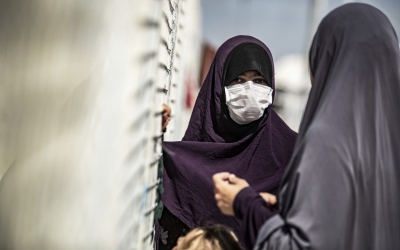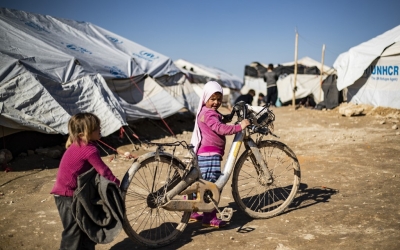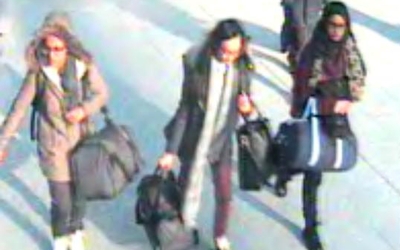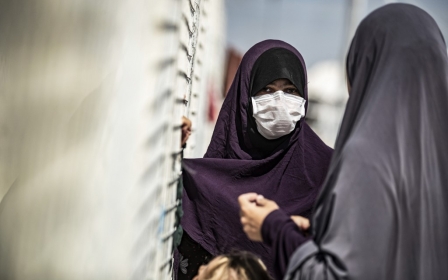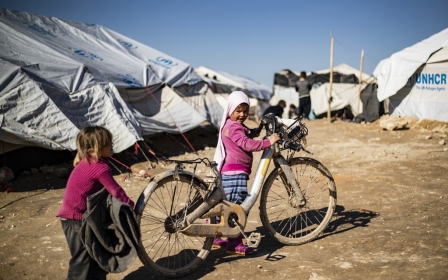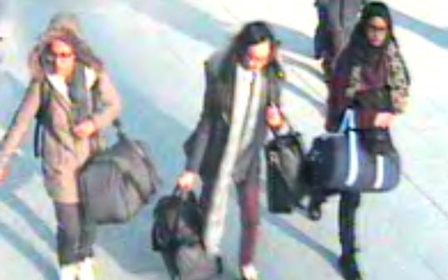Syria detention camps: European states accused over 'Guantanamo for children'
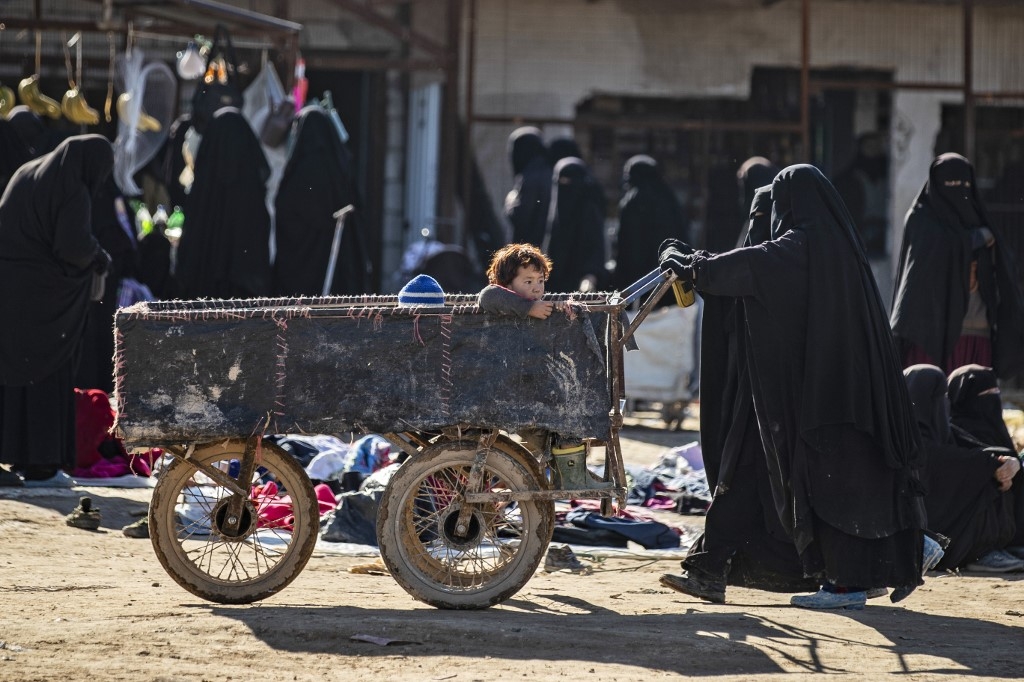
Western European countries have been accused of being complicit in the creation of a “Guantanamo for children” in camps for the families of suspected Islamic State (IS) fighters in northeastern Syria.
In a damning report on Wednesday, Rights and Security International (RSI), a London-based advocacy group, described “violent, unsanitary and inhumane” conditions in the camps that had led to the avoidable deaths of hundreds of babies and infants.
It said the continuing imprisonment of tens of thousands of women and children in the Kurdish-controlled al-Hol and al-Roj camps amounted to unlawful and arbitrary detention in which western countries were “directly implicated”.
Detainees had been subjected to “inhuman and degrading treatment” at the hands of Syrian Democratic Forces (SDF) guards and “extreme risks and trauma” that may amount to torture under international law, RSI said.
Detainees reported violent assaults by both SDF guards and other women inside the camps.
“RSI has received numerous reports of beatings, verbal abuse and coercive behaviour on the part of camp authorities,” the report noted.
Some mothers described being confined in tiny cells with their infant children for up to several weeks.
Others said they had been separated from young children left to fend for their themselves, including one mother separated from a baby she was still breastfeeding.
Sexual violence
Abdulkarim Omar, foreign affairs spokesperson for the Kurdish administration in northeastern Syria, told Middle East Eye that authorities in the region lacked the resources to manage the camps effectively and conceded that mistakes may have been made.
He said torture and degrading or humiliating treatment were forbidden and officials were trying to deal with the situation in accordance with international law.
“We are solely responsible for the safety and security of thousands of families of IS militants in al-Hol and al-Roj camps, something far beyond our modest capabilities, due to the failure of the international community to cooperate with us and their refusal to repatriate their citizens,” he said.
The report also raised concerns about sexual violence and exploitation within the camps, noting that reports of pregnancy in an annex to al-Hol where no adult men were detained “raises the realistic likelihood of sexual exploitation by male SDF officers”.
Omar told MEE that Kurdish officials had determined that male teenage detainees hidden in the women's section were responsible for the pregnancies and said that the security of the annex was the responsibility of female SDF guards.
'Strategic policy'
According to the report, a major cause of violence in the camps was conflict between women who remain committed to IS ideology and those who are, or are perceived to be, less adherent.
'It is a moral aberration to have a strategic policy which is leaving mostly children in a detention camp to die'
- Yasmine Ahmed, Rights and Security International
It cites the case of a 14-year-old Azerbaijani girl who was reportedly strangled to death after being sentenced by an IS "court" within the camp on a charge of failing to cover her face properly.
Yasmine Ahmed, executive director of RSI, said that the continuing refusal of most European countries to repatriate their nationals had left them stranded in conditions in which children are “routinely dying”.
RSI estimates there are 642 European children currently being held in the camps. Its report is based on testimonies and evidence gathered during visits to al-Hol and al-Roj in February.
At least 371 children are recorded as having died in the main al-Hol camp in 2019. At least 60 children died between January and August this year, according to Medicins San Frontieres.
Many of those deaths have been due to preventable and treatable conditions such as pneumonia, dehydration and malnutrition, while other infants in al-Hol have died of gunshot wounds, in tent fires and from carbon monoxide poisoning, RSI found.
Repatriation from Syria: A country-by-country breakdown
+ Show - HideMost Western governments have refused to repatriate their nationals on the grounds that they do not have consular services in Syria and citing security concerns. Some have called for foreign nationals accused of links to IS to be tried locally.
Campaigners say governments are not being candid about the extent of their contacts with Kurdish authorities. They point to the ad hoc repatriation of orphans, the presence on the ground of NGOs and journalists, and visits to the region by Western envoys as proof that they have the capacity - but not the political will - to bring their nationals home.
Some countries have said they will take children but nor adult detainees. Kurdish authorities have refused these requests and campaigners say that separating children from their primary carers would breach their human rights. Some children have been repatriated with their mother's consent.
The following figures are estimates based on official figures, data provided by campaign groups and MEE's own research.
Australia: Eight orphans repatriated in June 2019. About 20 women and 48 children remain in the camps, and 12 men in prisons.
Belgium: Six orphans repatriated in June 2019. Six women and 10 children repatriated in July 2021. Up to 15 men, six women, and 7 children still detained.
Canada: One orphan repatriated in October 2020. Eight men, 13 women, 26 children still detained
Denmark: Two orphans repatriated. 12 Danish nationals and 30 children still detained. Dual nationals in Syria stripped of Danish citizenship
France: 28 children repatriated. About 450 French nationals, including about 270 children, still detained. Several French citizens sent to Iraq and sentenced to death.
Germany: Four children repatriated in August 2019, and a mother and three children repatriated in November 2019. About 50 men, 50 women and 150 children still detained
Netherlands: Two orphans repatriated. Dutch Supreme Court ruled in June that government is not obliged to repatriate 23 women and 56 children still detained. At least 13 Dutch men also detained
Sweden: Seven orphaned siblings repatriated in May 2019. About 40 adults and 50 children still detained
UK: At least four children repatriated. About 26 men and women and 60 children still detained. Many dual nationals in Syria stripped of British citizenship
US: Washington has called for the repatriation of all foreign nationals and has offered to help countries to take back their own citizens. All 27 Americans known to have been in Kurdish custody have been repatriated
“It is more than turning a blind eye. These states are actively engaging in a policy that is leaving these people in these dire conditions outside of the law. They are actively doing it because they have said that their security approach is to leave them there,” Ahmed told MEE.
“This is a strategic policy. It is a moral aberration to have a strategic policy which is leaving mostly children in a detention camp to die.”
Growing pressure
RSI's report comes with western countries under growing pressure from family support groups and human rights campaigners to repatriate their nationals from Syria.
In a statement, Families for Repatriation International, a network of family support groups and campaigners in several western countries, said: “We call on our governments to immediately repatriate all of their citizens from arbitrary detention in northeast Syria.
“Our families are currently detained in these camps, in dreadful and inhumane conditions. History will remember that, no matter the current narrative that is circulated against our loved ones.”
The mother of a British detainee told MEE that the report raised further concerns about the conditions in which male prisoners were being held.
"In addition to the abuse and violence suffered by the women and children, the men have absolutely no freedom of movement, and no channel to communicate their human rights violations to the outside world," she said.
"Either western governments have to act urgently on this situation, or stop pretending that the concept of human rights has any place in their lexicon for international policy anywhere in the world."
The United States has also urged other countries to take responsibility for their own citizens and has offered assistance with repatriations.
Nathan Sales, coordinator for counterterrorism within the State Department, told a conference last week it was time for other countries to “step up”.
“The US has assisted a number of countries around the world with repatriating their citizens and that is a standing offer. We are ready to assist any country that wants to move forward. Give us a call and we'll find a way to make it work,” said Sales.
Repatriations obstructed
Governments in several countries are fighting legal battles to obstruct repatriations, however.
This week, the UK government went to the country's highest court, the Supreme Court, in a bid to overturn a ruling ordering it to allow the return of Shamima Begum in order for her to be able to appeal the deprivation of her citizenship.
Lawyers for the UK government said that Begum, one of the highest-profile foreign nationals in the camps who absconded from London aged 15, and others who had travelled to IS-controlled territory, posed a “national security threat”.
Most western countries have also refused calls to repatriate their nationals - with the exceptions of a few mostly orphaned children - on the grounds that they do not have consular facilities in Syria.
But RSI said that intelligence services from countries including the UK, France, Germany, Belgium and the Netherlands had a presence in the camps, and there was a “pre-established and tested repatriation method” for getting people out when governments decided to do so.
“This report establishes that the UK and EU states are directly implicated on the ground in northeast Syria, and have a direct and specific power to bring to an end the suffering of these women and children,” it said.
The report suggested that a high proportion of women and children in the camps were not committed to the IS cause and did not pose a security risk justifying their lengthy and unlawful detention.
Many reported being forced or manipulated into travelling to Syria by their husbands or by IS recruiters.
“For many of the women interviewed by RSI, Islamophobic treatment in their countries of origin influenced their decision to travel to Syria, with many saying that they went there in search of somewhere they could live and practise their religion in peace,” the report said.
Middle East Eye propose une couverture et une analyse indépendantes et incomparables du Moyen-Orient, de l’Afrique du Nord et d’autres régions du monde. Pour en savoir plus sur la reprise de ce contenu et les frais qui s’appliquent, veuillez remplir ce formulaire [en anglais]. Pour en savoir plus sur MEE, cliquez ici [en anglais].


